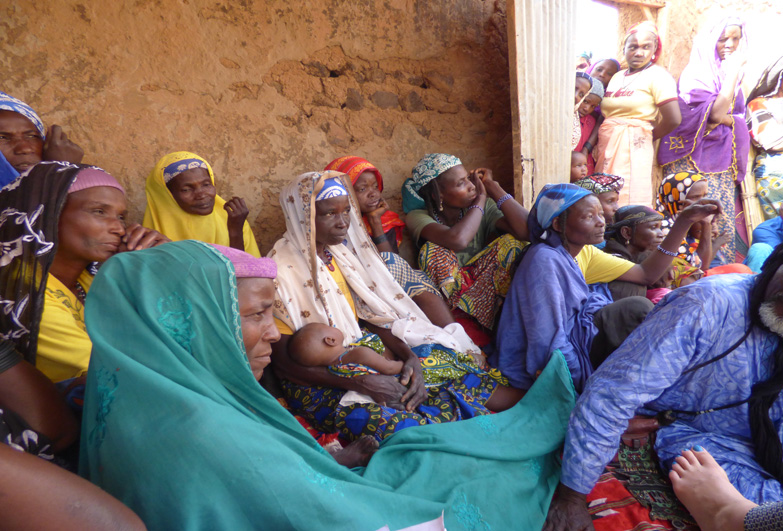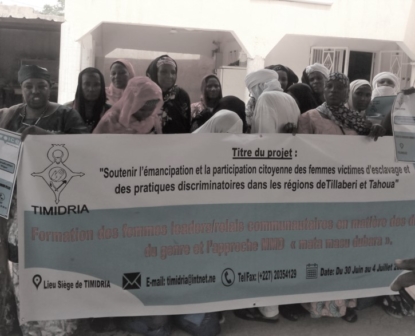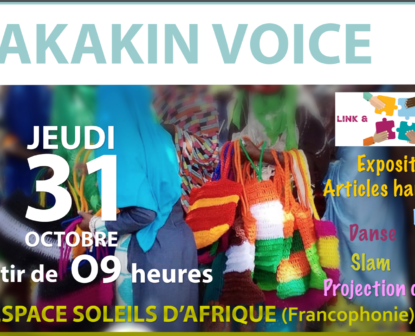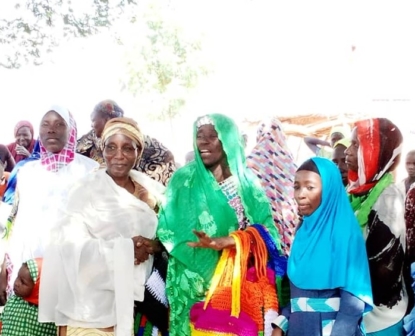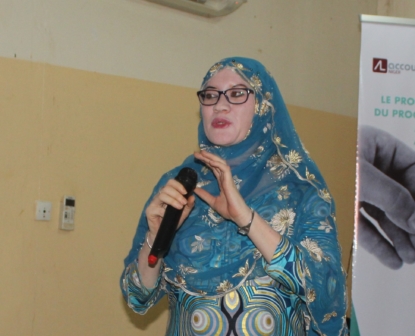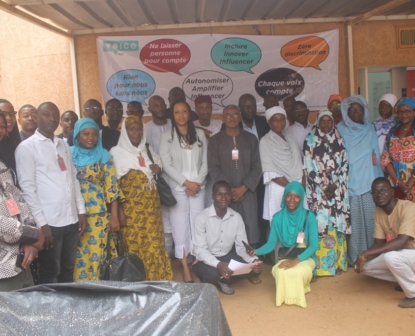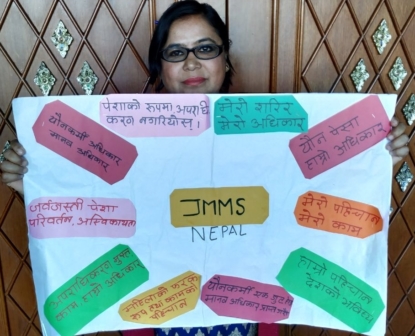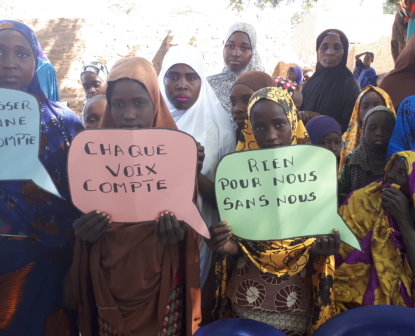Project
“EEE”: Emancipation to Eliminate Slavery: the women of North Niger
-
Amount Funded
190,339 EUROProject Duration
01 Feb 2018 - 31 Jan 2021 -
-
Lead organisation
TimidriaPartners
-
Timidria is a national organisation committed to the full abolition of all forms of slavery in Niger. The organisation was founded in 1991 by a group of Touareg descendants of former and liberated slaves. It represents the voices of hundreds of thousands of Nigeriens living in slavery-like conditions. Its members and sympathisers come from all over the country, but its focus is on the northern regions of Tahoua, Agadez and Tillaberi, predominantly rural areaa occupied by nomadic societies where forms of slavery still exist.
Three types of slavery still exist: active (forced labour), passive (discrimination) and modern (e.g. where women are married as fifth wives but treated as slaves). Nationally Timidria is a member of the CODDHD network (Collective of Organisations for the Defence of Human Rights and Promotion of Democracy), which has fifteen human rights organisations from Niger. It is also part of a Consortium for the Right to Food Security (together with Oxfam Novib’s other partners AREN, Mooriben and ANDDH). Its international partners include Anti-Slavery International and Oxfam Québec.
Timidria is present in seven regions as well as the city of Niamey, covering the whole country. It has nine sections, 32 subsections and 682 local bureaux. Timidria has about 300,000 members and friends. Every three years a National Assembly is held and a new board is elected.
-
Organisation
Timidria is a national organisation committed to the full abolition of all forms of slavery in Niger. The organisation was founded in 1991 by a group of Touareg descendants of former and liberated slaves. It represents the voices of hundreds of thousands of Nigeriens living in slavery-like conditions. Its members and sympathisers come from all over the country, but its focus is on the northern regions of Tahoua, Agadez and Tillaberi, predominantly rural areaa occupied by nomadic societies where forms of slavery still exist.
Three types of slavery still exist: active (forced labour), passive (discrimination) and modern (e.g. where women are married as fifth wives but treated as slaves). Nationally Timidria is a member of the CODDHD network (Collective of Organisations for the Defence of Human Rights and Promotion of Democracy), which has fifteen human rights organisations from Niger. It is also part of a Consortium for the Right to Food Security (together with Oxfam Novib’s other partners AREN, Mooriben and ANDDH). Its international partners include Anti-Slavery International and Oxfam Québec.
Timidria is present in seven regions as well as the city of Niamey, covering the whole country. It has nine sections, 32 subsections and 682 local bureaux. Timidria has about 300,000 members and friends. Every three years a National Assembly is held and a new board is elected.
-
Project
The Voice-funded project aims to enhance the visibility and citizen participation of women victims of slavery, facing double discrimination because of their membership in the “slave” caste as well as their gender. This double discrimination makes them particularly vulnerable to all forms of abuse, including slavery in its traditional form, the practice of Wahaya, domestic and / or sexual exploitation and discrimination.
The low status of women in Niger and the burden on children offers few to no alternatives to women victims of slavery and associated practices. Isolated and marginalised, women who are victims of slavery have few opportunities to confront their exploitation and to raise their demands. The narratives of slavery are dominated by male voices, while the experiences of women are dominated by those voices belonging to the elite class.
The project creates frameworks for exchange, sharing of information processing, through the use of communication channels as diverse as they are varied so that the women understand their most fundamental rights, organise themselves, make their voices heard as well as their needs and demands, get involved in debates around slavery and women’s rights and participate in advocacy actions at local, national and / or international level.
It should be noted that the persistence of slavery in Niger has become a concern for both the government and the international community. To overcome this phenomenon, Niger accepted a number of recommendations on this issue during the last Universal Periodic Review in 2016 but also by the United Nations Special Rapporteur on Contemporary Forms of Slavery during his visit to Niger. However, the implementation of these recommendations remains weak. The advocacy envisaged in the context of this project helps to encourage the State of Niger to implement these recommendations, which mainly concern political reforms as well as legislative changes.
There are a series of awareness-raising activities (awareness-raising caravans, sensitisation on community radios), mobilisation (road shows), advocacy (regional conferences, roundtables in Niamey, advocacy meetings, submission of shadow reports to United Nations bodies, etc.). With its undeniable expertise on the issue of slavery in its classic form depriving victims of the right to property, choice in marriage, access to many other socio-economic and political rights, and other related practices (the practice of Wahaya, land grabbing, prohibition of inter-caste marriages, discrimination), its presence in the field and its community base, Timidria is ideally placed to successfully implement this project. Its women’s groups will play a major role in bringing the association closer to women who are victims of slavery, bringing attention and understanding to the problems faced by women. At the international level, the partnership with Anti-Slavery International – an emblematic partner of Timidria in the fight against slavery – mobilises the international community around the situation of women victims of slavery and facilitate their direct access to United Nations platforms, to make their voices heard.
-
-
The Voice-funded project aims to enhance the visibility and citizen participation of women victims of slavery, facing double discrimination because of their membership in the “slave” caste as well as their gender. This double discrimination makes them particularly vulnerable to all forms of abuse, including slavery in its traditional form, the practice of Wahaya, domestic and / or sexual exploitation and discrimination.
The low status of women in Niger and the burden on children offers few to no alternatives to women victims of slavery and associated practices. Isolated and marginalised, women who are victims of slavery have few opportunities to confront their exploitation and to raise their demands. The narratives of slavery are dominated by male voices, while the experiences of women are dominated by those voices belonging to the elite class.
The project creates frameworks for exchange, sharing of information processing, through the use of communication channels as diverse as they are varied so that the women understand their most fundamental rights, organise themselves, make their voices heard as well as their needs and demands, get involved in debates around slavery and women’s rights and participate in advocacy actions at local, national and / or international level.
It should be noted that the persistence of slavery in Niger has become a concern for both the government and the international community. To overcome this phenomenon, Niger accepted a number of recommendations on this issue during the last Universal Periodic Review in 2016 but also by the United Nations Special Rapporteur on Contemporary Forms of Slavery during his visit to Niger. However, the implementation of these recommendations remains weak. The advocacy envisaged in the context of this project helps to encourage the State of Niger to implement these recommendations, which mainly concern political reforms as well as legislative changes.
There are a series of awareness-raising activities (awareness-raising caravans, sensitisation on community radios), mobilisation (road shows), advocacy (regional conferences, roundtables in Niamey, advocacy meetings, submission of shadow reports to United Nations bodies, etc.). With its undeniable expertise on the issue of slavery in its classic form depriving victims of the right to property, choice in marriage, access to many other socio-economic and political rights, and other related practices (the practice of Wahaya, land grabbing, prohibition of inter-caste marriages, discrimination), its presence in the field and its community base, Timidria is ideally placed to successfully implement this project. Its women’s groups will play a major role in bringing the association closer to women who are victims of slavery, bringing attention and understanding to the problems faced by women. At the international level, the partnership with Anti-Slavery International – an emblematic partner of Timidria in the fight against slavery – mobilises the international community around the situation of women victims of slavery and facilitate their direct access to United Nations platforms, to make their voices heard.
-
News

